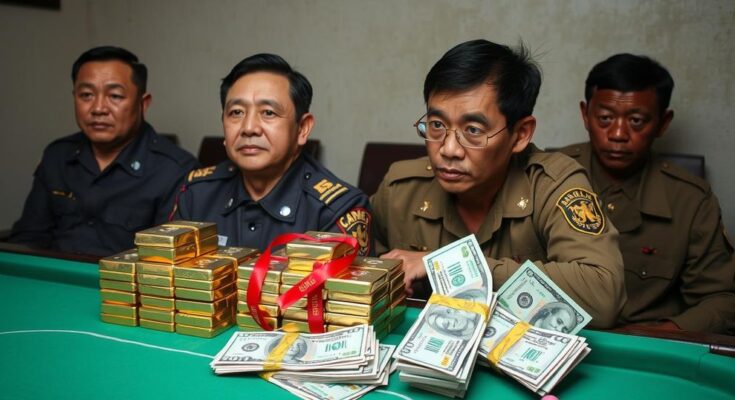Three Chinese nationals were arrested in eastern Democratic Republic of Congo while in possession of 12 gold bars and $800,000 in cash. The discovery was made following a secret operation due to previous arrests of other Chinese miners and concerns about corruption within the mining sector. The region remains a hotspot for exploitation and violence fueled by mineral wealth, prompting legal actions against international companies tied to such activities.
In a significant incident in eastern Democratic Republic of Congo, three Chinese nationals were apprehended in possession of 12 gold bars alongside $800,000 in cash. The authorities disclosed that the contraband was discreetly hidden under the vehicle’s seats. Jean Jacques Purusi, the governor of South Kivu province, noted that the operation was conducted under secrecy following the controversial release of another group of Chinese individuals previously accused of operating an illegal gold mining site. The region is rich in gold, diamonds, and various minerals, which have been subjected to exploitation by foreign entities for decades, contributing to ongoing regional instability.
Militia groups have taken control of many mines, profiting by selling these resources to intermediaries with connections to influential figures in Kinshasa. Purusi emphasized that these ties necessitated the confidential nature of the latest arrests, which were executed based on an informant’s tip-off. The vehicle was thoroughly searched in Walungu, close to the Rwandan border, although the exact quantity of gold confiscated remains undisclosed. This operation follows a recent incident where 17 Chinese nationals were released after being arrested for illicit mining activities, a development that Purusi condemned for undermining efforts to reform DR Congo’s exploitative mineral sector.
Moreover, relations between DR Congo and Rwanda are tense due to accusations involving the trafficking of illegal minerals, which has linked resource exploitation to violence and humanitarian abuses within the country. The Congolese government has initiated legal proceedings against Apple for its association with so-called “blood minerals,” which allegedly finance armed conflicts and contribute to severe human rights violations, including forced child labor. The ongoing complications surrounding mineral extraction in the region reflect long-standing issues that have historically plagued the Democratic Republic of Congo.
The Central African nation of Democratic Republic of Congo (DRC) possesses vast natural resources, including gold, diamonds, and minerals essential for modern technology. However, this resource wealth has attracted foreign exploitation, leading to rampant illegal mining operations run often by militias. The region has faced significant instability and conflict, rooted in both local and international interests in these valuable resources. Government efforts to regulate and monetize these minerals, particularly in confronting illegal operations, are met with challenges, including powerful influences and corrupt practices. The consequential socio-economic issues include human rights violations and environmental destruction, which have garnered international attention, placing pressure on companies and governments involved in the supply chain of these resources.
In conclusion, the recent arrests of three Chinese nationals in the Democratic Republic of Congo underscore the persistent challenges of illegal gold mining and resource exploitation in the region. These arrests reveal complex dynamics involving international actors and local militia, highlighting the ongoing struggle for regulatory control over the country’s rich mineral wealth. The situation exemplifies the deep-rooted issues of corruption and conflict surrounding the mining industry in the DRC, raising vital questions about the ethical sourcing of minerals on a global scale.
Original Source: www.bbc.com




